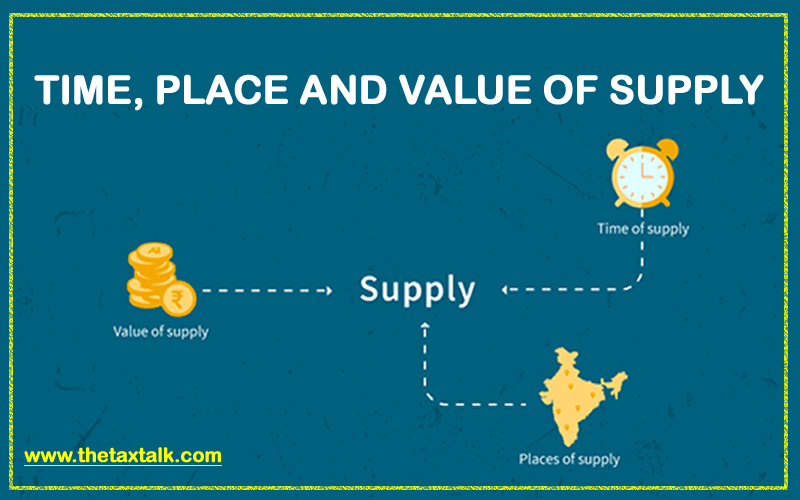![]()
TIME, PLACE AND VALUE OF SUPPLY
Under GST, 3 types of taxes can be charged in the invoice. SGST and CGST in
case of an intra-state transaction and IGST in case of an interstate transaction. But
deciding whether a particular transaction is inter or intrastate is not an easy task.
Why are time place and value of supply important?
Time of supply means the point in time when goods/services are considered
supplied’. When the seller knows the ‘time’, it helps him identify due date for
payment of taxes.
Place of supply is required for determining the right tax to be charged on the
invoice, whether IGST or CGST/SGST will apply.
Value of supply is important because GST is calculated on the value of the sale. If
the value is calculated incorrectly, then the amount of GST charged is also incorrect.
Time of Supply
Time of supply means the point in time when goods/services are considered
supplied’. When the seller knows the ‘time’, it helps him identify due date for
payment of taxes.
CGST/SGST or IGST must be paid at the time of supply. Goods and services have a
separate basis to identify their time of supply. Let’s understand them in detail
Time of Supply of Goods
Time of supply of goods is earliest of:
- Date of issue of invoice
- Last date on which invoice should have been issued
- Date of receipt of advance/ payment
Time of Supply for Services
Time of supply of services is earliest of:
- Date of issue of invoice
- Date of receipt of advance/ payment.
- Date of provision of services (if invoice is not issued within prescribed
period)
Place of supply
It is very important to understand the term ‘place of supply’ for determining the
right tax to be charged on the invoice
Place of Supply of Goods
Usually, in case of goods, the place of supply is where the goods are
delivered.
So, the place of supply of goods is the place where the ownership of goods
changes.
What if there is no movement of goods. In this case, the place of supply is the
location of goods at the time of delivery to the recipient.
Place of Supply for Services
Generally, the place of supply of services is the location of the service
recipient.
In cases where the services are provided to an unregistered dealer and their
location is not available the location of service provider will be the place of
provision of service.
Special provisions have been made to determine the place of supply for the
following services:
Services related to immovable property
Restaurant services
Admission to events
Transportation of goods and passengers
Telecom services
Banking, Financial and Insurance services.
In case of services related to immovable property, the location of the property
is the place of provision of services.
Value of Supply of Goods or Services
Value of supply means the money that a seller would want to collect the goods
and services supplied.
The amount collected by the seller from the buyer is the value of supply.
But where parties are related and a reasonable value may not be charged, or
transaction may take place as a barter or exchange; the GST law prescribes
that the value on which GST is charged must be its ‘transactional value’.
This is the value at which unrelated parties would transact in the normal
course of business. It makes sure GST is charged and collected properly,
even though the full value may not have been paid.

